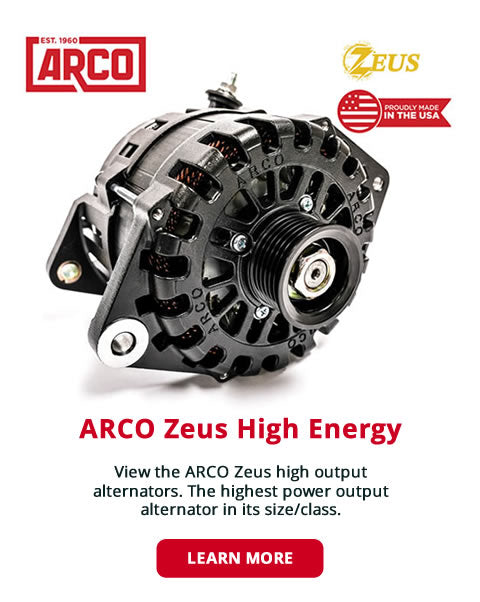
Why would I use an External Alternator Regulator to charge my batteries?
Should you invest in an external alternator regulator to effectively charge your deep-cycle lithium or lead-acid batteries?
Curious about optimizing your energy system? Wondering how an external alternator regulator can fit into your setup?
If you're upgrading the energy system in your RV, van, or boat, understanding the role of an external alternator regulator is essential. Protecting your investment from short-term and long-term damage is a primary goal behind ARCO's innovative Zeus high-energy alternator regulator.
Why Use an External Alternator Regulator to Charge Your Batteries?
1. Temperature Compensation During Charging
Deep-cycle lead-acid batteries are widely used in applications like solar panels, RVs, and power tools due to their ability to be discharged and recharged repeatedly. However, these batteries are sensitive to temperature fluctuations.
As battery temperature rises, the chemical reactions during charging accelerate, risking overheating and damage. Temperature-compensated charging adjusts the battery voltage based on its actual temperature, ensuring safe operation. Internal voltage regulators in most modern alternators lack this feature, leading to potential overheating if the battery is charged at a constant voltage in hot conditions.
Using an external alternator regulator that accounts for temperature is crucial for proper charging of deep-cycle lead-acid batteries.
2. Precise Charging for LiFePo4 Batteries
LiFePo4 batteries are particularly sensitive to overcharging and require strict adherence to charging voltages and maximum absorption durations. An internal regulator cannot be programmed for LiFePo4 batteries, risking overcharging or excessive current draw that can damage both the battery and the alternator.
External alternator regulators designed for LiFePo4 batteries come with safety features to prevent overcharging and current spikes, allowing for customizable settings tailored to your specific battery type.
3. Enhanced Performance for Large Battery Banks
Internally regulated alternators are primarily designed for starting batteries and may struggle to charge larger house battery banks, leading to overheating and premature failure. They operate on a fixed voltage that may not meet the varying needs of a larger battery system.
External alternator regulators provide:
- Better Heat Management: They monitor the alternator's temperature, adjusting output to prevent overheating.
- More Precise Charging: They deliver a tailored charging profile that can extend battery life.
- Flexibility: Compatible with a wider range of alternators, making them suitable for older or high-output systems.
If you have a large house battery bank, investing in an external alternator regulator can protect your alternator and enhance battery longevity.
4. Comprehensive Charging Stages
Internally regulated alternators typically offer only two charging stages: Bulk and Absorption. Once the battery voltage reaches a certain level, they switch to Absorption, maintaining that voltage indefinitely, which can lead to overcharging, especially for deep-cycle batteries.
External smart alternator regulators feature multiple charging stages—bulk, absorption, and float—ensuring batteries are charged properly and protected from damage. They can be programmed to meet manufacturer requirements precisely.

Conclusion
In this article, we hope to clarify the benefits of adding an alternator regulator to your energy system. An external alternator regulator controls the voltage and current output of an alternator, safeguarding batteries from overcharging and extending their lifespan.
Key reasons to use an external alternator regulator include:
- Temperature Compensation: Essential for protecting deep-cycle lead-acid and LiFePo4 batteries from overheating.
- Multiple Charging Stages: Ensures batteries are fully charged without the risk of overcharging.
- Overcharging Protection: Built-in safeguards to prevent battery damage.
For those with deep-cycle batteries in their RV, van, or boat, an external alternator regulator is a wise investment to protect and prolong battery life.
For additional insights, learn more about this upgrade in our learning center.


